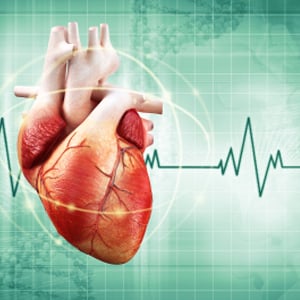
Summary
- A tachycardia is an increase in heart rate above the normal rate. Ventricular tachycardia refers to a tachycardia which arises in the ventricles of the heart.
- Symptoms associated with ventricular tachycardia depend on the rate of the heartbeat, how long the tachycardia lasts and the presence and extent of underlying heart disease.
- Before starting treatment it is important to weigh up the risk to benefit of treating each specific type of ventricular tachycardia. This is because the drugs used to control arrhythmias are capable of producing or exacerbating the very arrhythmias they are designed to prevent.
- The outcome depends on the underlying disease state. If sustained ventricular tachycardia develops within the first six weeks after a heart attack, the prognosis is poor and 85% of patients will die within one year if not treated.
What is ventricular tachycardia?
A tachycardia is an increase in heart rate above the normal rate. Ventricular tachycardia refers to a tachycardia which arises in the ventricles of the heart.
Ventricular tachycardia is defined as "a salvo of consecutive ventricular heart beats at a rate of more than 120 beats per minute which persists for greater than 30 seconds or which must be stopped because blood is no longer being pumped normally by the heart".
This is what is called sustained ventricular tachycardia. Non-sustained ventricular tachycardia refers to very brief runs of heart rate above 120 beats per minute.
Sustained ventricular tachycardia is usually seen in people who have ischaemic heart disease and who have had a previous heart attack (myocardial infarction). It can also be associated with non-ischaemic cardiomyopathy, metabolic disorders, drug toxicity and a syndrome called the prolonged QT syndrome. This refers to a particular pattern on an electrocardiogram (ECG).
It can also occur without obvious structural heart disease or other predisposing factors.
Non-sustained ventricular tachycardia is also associated with heart disease, but it occurs in normal people more often than sustained ventricular tachycardia and usually does not produce symptoms.
What are the symptoms and signs?
Symptoms associated with ventricular tachycardia depend on the rate of the heartbeat, how long the tachycardia lasts and the presence and extent of underlying heart disease.
When the tachycardia is fast and is associated with severe heart disease and cerebrovascular (brain and blood vessel) disease, then low blood pressure and fainting (syncope) are common.
Treatment
Before starting treatment it is important to weigh up the risk to benefit of treating each specific type of ventricular tachycardia. This is because the drugs used to control arrhythmias are capable of producing or exacerbating the very arrhythmias they are designed to prevent.
In general, patients with ventricular tachycardia, but with no heart disease, have a benign course to their problem. Those with non-sustained ventricular tachycardia, who have no symptoms, need not be treated since it will make no difference to the outcome.
Patients with sustained ventricular tachycardia, even without heart disease, generally need treatment, because they have symptoms. The drugs used are different types of beta-blockers, amiodarone and occasionally verapamil.
In patients with ventricular tachycardia and organic heart disease, if the blood pressure is very low and there is loss of consciousness or evidence of lack of blood to the heart muscle, congestive heart failure or poor blood supply to the brain, the arrhythmia should be stopped as fast as possible using electrical cardioversion.
If none of the above problems arise, then drug therapy can be tried. Lignocaine is the drug used most often in acute ventricular tachycardia. It may or may not stop the tachycardia, but will slow the rate.
In stable patients in whom these drugs do not stop the tachycardia, an ICD can be inserted which will restore normal rhythm.
Specific drugs are then used to prevent the tachycardia from recurring. The type of drug is chosen after testing different drugs on the patient. The one which prevents the tachycardia from starting, is the drug used. Using this technique, long-term successful prevention of the tachycardia can be expected in 70-90% of patients.
More recently, radiofrequency ablation therapy (catheter ablation) has cured some types of ventricular tachycardia, particularly those which are not associated with ischaemic heart disease in young people.
What is the outcome?
The outcome depends on the underlying disease state. If sustained ventricular tachycardia develops within the first six weeks after a heart attack, the prognosis is poor and 85% of patients will die within one year if not treated.
However, modern treatment techniques are highly successful. A combination of drugs such as a beta-blocker and an ACE inhibitor – and an implantable cardioverter defibrillator (ICD) will allow many people a reasonable quality of life.
An ICD is a type of pacemaker which monitors the heart constantly. Each time ventricular tachycardia is sensed, the ICD will respond and correct the abnormal rhythm. If the abnormal rhythm is not corrected by simple cardioversion, than the ICD will deliver a shock, which will force the heart back into normal rhythm.
The ICD is effectively a mobile coronary care unit. However, this is an expensive option, and not available to everyone.
Patients with non-sustained ventricular tachycardia following a heart attack have a threefold greater risk of death than a comparable group of patients without this arrhythmia.
However, no cause-and-effect relationship between non-sustained tachycardia and subsequent sudden death has been established.




 Publications
Publications
 Partners
Partners















